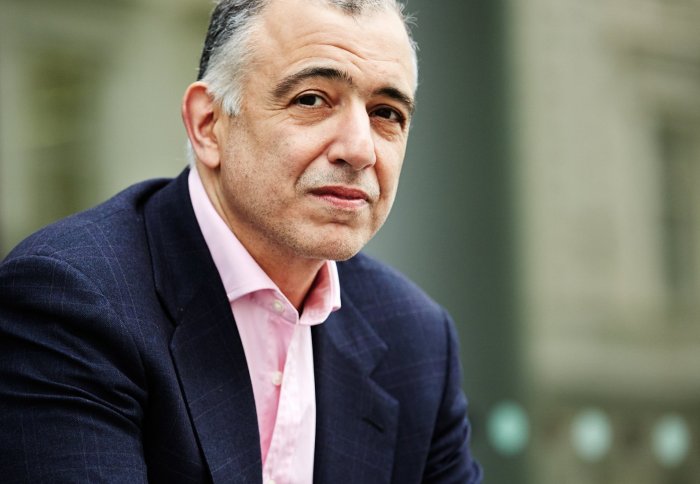Imperial researcher wins Institution of Engineering and Technology's top honour
by Maxine Myers

A leading inventor of medical device technology has been awarded the highest honour from the UK's Institution of Engineering and Technology (IET).
Professor Chris Toumazou, Regius Professor of Engineering, has been awarded the IET’s 2014 Faraday Medal for his pioneering work in inventing semiconductor DNA sequencing with the ability to revolutionise healthcare and save lives.
Professor Toumazou ‘s technology uses small silicon microchips to identify genetic mutations that determine a person’s predisposition to certain hereditary diseases. The chips can provide medical diagnosis in just a few hours rather than weeks, analysing data on the spot using a portable, low power device. The technology represents a great stride forward in medicine as it shifts emphasis from treating illnesses to preventing and diagnosing them in a targeted manner. In June this year, Professor Toumazou’s technology was also recognised by the European Patent Office when he was awarded the prestigious 2014 European Inventor of the Year Award for Research.
Commenting on the award, Professor Toumazou, from the Department of Electrical and Electronic Engineering, said: “I am very thankful to the Institution for considering my work for this prestigious award. Being chosen as the 2014 winner is a true honour. Throughout my entire career I have worked to bring electronic inventions to healthcare markets where there is a critical and urgent need. For me, the ability to use semiconductor sequencing to provide a medical diagnosis in just a few hours that once took days is a crucial step in saving the lives of patients. This is particularly significant for the treatment of sepsis – a whole body inflammation - where every minute matters.”
Professor Jeff Magee, Dean of the Faculty of Engineering, said: “This has been a fantastic year for Chris who has already been recognised as Inventor of the Year in the research category by the European Patent Office. I want to extend my warmest congratulations to Chris on this next accolade, which he richly deserves. Chris’ technology could potentially save lives and it also could make the UK a market leader in personalised healthcare.”
Professor Toumazou’s invention could make DNA testing more economical for clinics and hospitals that once had to spend upwards of half a million US dollars on conventional DNA-sequencing machines.
The technology also has economic benefits for the British economy. The global market potential for DNA sequencing is huge. By 2016, it is expected to be worth US $6.6 billion and grow by 17.5% annually. The emergence of breakthrough technologies such as Professor Toumazou’s cost-efficient application for testing DNA could potentially help the UK to be a leader in this field.
Professor Toumazou has established the DNA Electronics (DNAe) company to market its semiconductor DNA sequencing technology for healthcare applications. DNAe’s priority focus is on infectious disease diagnostics and the company’s first test will be a DNA diagnostic for use in the management of Sepsis.
Sepsis is a common and potentially life-threatening condition triggered by an infection. The condition can produce widespread inflammation, swelling and blood clotting, which can lead to a significant decrease in blood pressure. As a result blood supply to vital organs such as the brain, heart and kidneys is reduced.
m Sepsis, more than from lung cancer, and time is a critical factor in survival. Professor Toumazou’s invention will enable clinicians to intervene before Sepsis sets in to diagnose rapidly and accurately what infection a patient has and to help select the antibiotic that will work to treat the disease.
Professor Toumazou has also been involved as Chief Scientific Advisor in the creation of the world’s first DNA test retail store in London called Geneu. Customers can have their skin genes analysed within 30 minutes and bespoke anti-ageing serums are created for them based on their results.
Professor Toumazou received a degree in electrical engineering at Imperial. He began his career developing energy-efficient microchips for mobile phones. At the age of 33, he became Imperial’s youngest ever professor, where he focused on ways of combining electrical engineering and microchip technology with biomedicine - an achievement all the more remarkable for someone who left school at 16 with no qualifications.
Toumazou’s decision to delve into the world of genetic disorders came about after his son Marcus was diagnosed with a rare hereditary form of kidney disease. He aimed for a technology that would facilitate early detection, helping medicine go from healing illnesses to preventing them.
Professor Toumazou will be presented with this year’s Faraday medal at an awards ceremony on 19 November.
Article text (excluding photos or graphics) © Imperial College London.
Photos and graphics subject to third party copyright used with permission or © Imperial College London.
Reporter
Maxine Myers
Communications Division